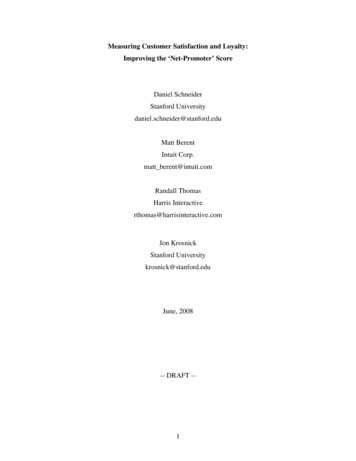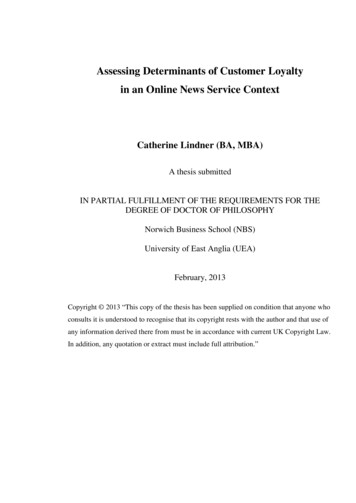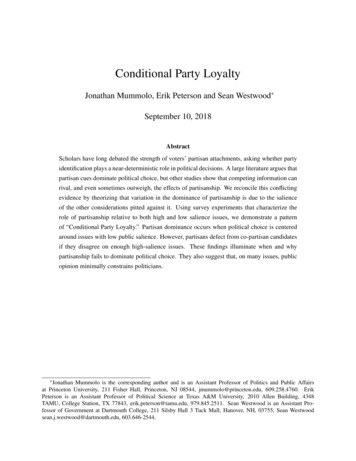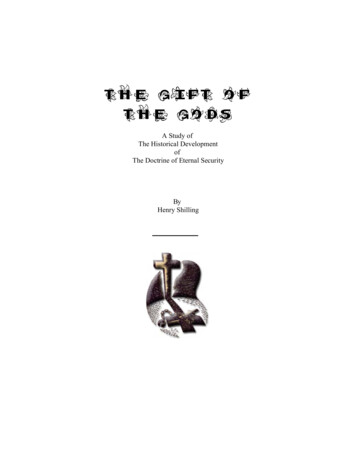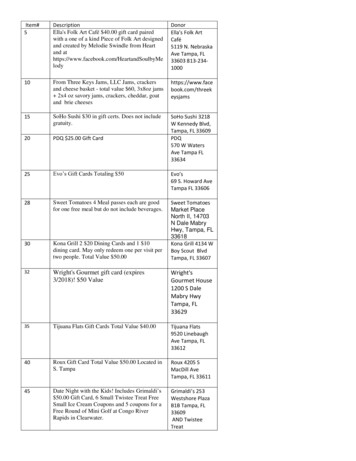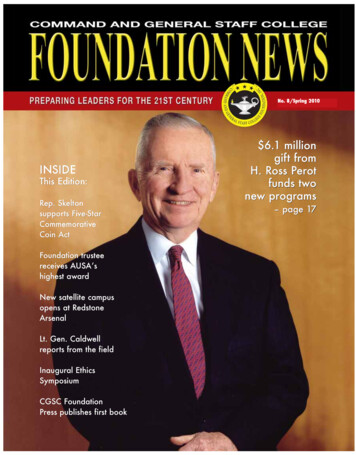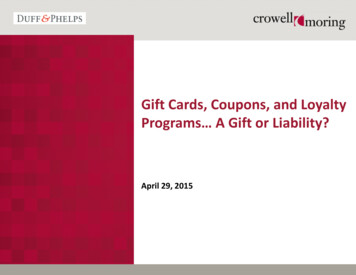
Transcription
Gift Cards, Coupons, and LoyaltyPrograms A Gift or Liability?April 29, 2015
Today’s Agenda Brief overview of stored value product offerings Federal and State gift card laws Unclaimed property implications for gift cards– Holder’s rights and State challenges to issuers– Card Compliant case update Consumer protection enforcement & class action trends Current landscape Planning considerations Q&A2
Moderator – Walter Nagel Focuses on tax planning, tax policy, and controversies for Fortune 500 clients. Strong experience in the corporate sector, having previously served as vicepresident and general tax counsel for MCI and as the president of Peracon, anelectronic commerce company. An adjunct professor of law at the Georgetown University Law Center.Crowell & Moring LLPPartner, TaxGovernment ExperienceU.S. Advisory Commission on ElectronicCommerce—Counsel to CommissionerU.S. Multistate Tax Commission—Advisor,Multistate Tax CommissionState Government: District of Columbia—Member, D.C. Tax Revision CommissionEducationRutgers College, B.A. political scienceThe Rutgers Business School, MBAThe Rutgers School of Law, Newark, J.D.Georgetown University Law Center, LL.M. Has a nationally recognized practice in the taxation of major corporations withparticular experience in the taxation of digital goods, having spent over adecade working on technology, telecommunications, and electronic commercematters, including as counsel to one of the commissioners of the U.S. AdvisoryCommission on Electronic Commerce and as an advisor to the Multistate TaxCommission. Named a D.C. Super Lawyer from 2012 - 2015, an honor reserved for fivepercent of practitioners. Has appeared in The Washington Post, The Wall Street Journal, FOX BusinessChannel and is the editor of two legal treatises. Has been invited to speak before the Congressional Internet Caucus, the IRS,the National Conference of State Tax Judges, the Congressional Chief of StaffRetreat, the Federation of Tax Administrators, the Multistate Tax Commissionand numerous taxpayer organizations, bar associations and law schools. Has extensive experience handling federal securities law matters dealing withsome of the largest mutual funds in the country.3
Speaker – Robert PetersDuff & Phelps, LLCManaging Director, Tax ServicesEducationNew York University – MBA, financeStanford University – Executive MBAUniversity of Denver – B.S.,accounting, cum laudeCertified Public AccountIL and NY Has 30 years of experience providing state, local and federal tax services tocorporate clients, ranging from Fortune 50 to emerging and mid cap companies. Specialization includes leading national unclaimed property, sales tax advisory, andcompliance service areas. Assists companies in audit representation, voluntary disclosures, implementation ofbest practices and co/outsourcing of unclaimed property and sales tax compliance. Has been on the forefront of helping companies to effectively plan in the growingarea of issuing stored value, gift card and consumer rebate programs, includingworking with states and industry leaders in addressing the unclaimed propertyissues resulting from such programs. Serves the consumer markets, retailers, manufacturing, public utilities,transportation, telecommunications, health care, media and financial servicesindustries. A frequent speaker on unclaimed property and multi-state tax topics for manyorganizations, including Tax Executives Institute, Treasury Management Association,Financial Executives Institute, National Professional Unclaimed PropertyOrganization, Chicago Tax Club and National Association of Credit Managers. Has been quoted in the Wall Street Journal and authored a series of articles onunclaimed property and state tax topics appearing in State Tax Notes, Forbes, MultiState Taxation and Incentives, Financial Executives Magazine, BNA State Tax Reportand Valuation Insights. Previous experience includes 29 years with KPMG, LLP as national partner in chargeof state and local taxes, Midwest area tax risk advisory partner, unclaimed propertyleader and tax partner in charge of the Stamford office A prior chairman of the Ct. State Tax Committee, a committee member of the IllinoisTax Federation and he is on the Manufacturing Committee of the UnclaimedProperty Professional Organization.4
Speaker – David ErvinCrowell & Moring LLPPartner, Advertising & ProductRisk Management and IPGovernment ExperienceU.S. Government AccountabilityOffice—Office of the General CounselEducationAmerican University, J.D. — cum laudeAmerican University, B.A.international relations — cum laudewith university honors Focuses on the relationship between advertising and intellectual property law. Provides counsel on current industry topics, including social media, gift cardsand payment devices, branded content, native advertising, IoT and geolocation, fair use, and blogging. Clients include companies in the automotive, hospitality, wireless, retail,fashion, food & beverage, software, internet service providers (ISP), andfinancial services industries, as well as professional athletes, musicians, andsports leagues. Helps clients manage and protect their brands and IP rights in connection withtheir advertising, media, sponsorship, licensing, sports marketing, ecommerce, loyalty program, and joint promotion activities. Handles the negotiation and drafting of marketing, sponsorship, endorsement,and promotion agreements for advertisers and agencies with entertainmentproperties, broadcasters, publishers, athletes, models, celebrities, andprofessional sports leagues and teams (including the NFL, NASCAR, IndyCar,NBA, MLB, NHL, MLS, NCAA, and PBR). Assists clients with advertising production and media placement matters thatinvolve music and content clearance, rights of publicity, SAG/AFTRA, claimsubstantiation, media barter, product placement, and new media issues. Recommended by US Legal 500 2012-2014 for his work in the Marketing &Advertising area, and is listed as a leading lawyer in both The InternationalWho's Who of Sports & Entertainment Lawyers 2013 and 2014 and TheInternational Who's Who of Business Lawyers 2014.5
Overview of Stored Value Products6
Overview of Stored Value Products Gift card products:– Open Loop Cards– Closed Loop Cards Loyalty, rewards, and promotional programs– “Free” member, points-based programs– Incentives/give-aways– Daily deals Other stored value products:– Mio Card and Bluebird account– Payment devices, virtual currencies, and more7
Gift Card Products Open Loop Gift Cards:– Open system network like Visa or MasterCard– Redeemable at unlimited number of accepting merchants– Third party bank is the issuer – bank exempt from state moneytransmitter license requirementsClosed Loop Gift Cards:– Closed system – single merchant or affiliated merchants– Merchant is the issuer– No money transmission, only redemption of goods & servicesUniversal gift cards – 5 year term, reloadable, branded cards at stadiums,venues, colleges, etc.Heavily regulated industry – federal/state laws8
Estimated U.S. Gift Card Spending,2008-2014In Billions Growth peaked in2012, Projectedsales to reach 150billion in 2017, ECards gainingground 50 45 40 35 30 25 20 15 10 5 fting
Loyalty, Rewards, and Promotional Programs Traditional rewards or loyalty program akin to rebateprogram – and generally less regulated than gift cards– Promotional nature: benefits provide incentive to remain loyal– Contractual reality: terms create consumer contract Promotional cards & free codes:– Short-term, campaign driven and low face value– Frequently used for customer acquisition and events Daily Deals and hybrid promotional offers: 20 for 40– Paid value: pre-paid, voucher-based for merchant– Promotional value: limited period discount at merchant10
U.S. Loyalty Program Memberships, 2000-2012Growth in billions Since 2000, average growth isabout 8.7% compounded3.00 Repeat customers spend 67% morethan a new customer Average adult in enrolled in 18programs, active in only 5-72.001.50 70% of Millennials wouldn’t beloyal to a company withoutrewards program 2.501.000.5061% of retailers use LoyaltyPrograms0.002000 2006 2008 2010 201211
Loyalty Program Segment Growth, 2006-2012Percentage of Growth The Restaurantindustryexperiencedexplosive growth;295% over theperiod 2006through 2012300%250%200%150%100%50%0%2006 through 2012AirlineHotelCruise & Car RentalGamingRestaurant12
Explosive Growth of Rewards Programs Americans earned approximately 48billion in frequent flyer miles, hotelrewards, credit card points and otherloyalty program currency just in 2011alone. ¹Of the value earned in 2011, nearly33% or 16 billion went unredeemed.²There were 2.6 billion rewards/loyaltyprogram memberships in the U.S. in2013, an increase of 26.7% from 2012.³Customers loyal to a single retailer cangenerate up to 55% - 70% of thecompany’s sales. 4Loyalty/Reward PointsEarned and Redeemed in2011 16billion 32 billionRedeemed in 2011Unredeemed in 20111,2 3 Source:Colloquy4 Source: CRM at Northwestern University13
Other Stored Value Products Prepaid, reloadable cards:–––––Mio Card MyVanilla CardGreen Dot CardIssuers like InComm are licensed state money transmittersIssuers like Green Dot Bank are actually banksUse credit card payment networks like Visa and MasterCard Prepaid payment services and non-bank accounts:– AmEx Bluebird account: Benefits of banking without all the fees– AmEx Serve Card: cash reload, ATM access, online bill pay– Use AmEx network and retail partners like Walmart, CVS, etc.14
Federal and State Gift Card Laws15
Gift Card Overview Federal law sets the floor on consumer protection minimum required State laws makes national gift card program nearlyimpossible to manage in full compliance; some states havemore restrictive laws, some are conflicting The biggest issue Escheatment of gift card breakage andimpact on revenue and costs– Property is a state law issue and varies widely– Delaware v. Card Compliant case may change the whole gamefor many issuers16
Federal Gift Card Law: What it Covers The Credit Card Accountability Responsibility and Disclosure Act of2009 (“CARD” Act):– Does not preempt state gift card laws, except if state laws are inconsistentwith the Act. Minimum level of gift card regulation– Applies broadly to gift cards, stored value cards, and general use prepaidcards– Exclusions: Loyalty, award, or promotional gift cards, plus Gift cards used solely for telephone services;Gift cards that are reloadable, not marketed or labeled as a GC;Gift cards that are not marketed to the general public;Gift certificates issued only in paper; orGift cards redeemable only for admission to events or venues at particularlocations– CARD Act jurisdiction under Consumer Financial Protection Bureau (CFPB) perDodd-Frank Act of 2010 No enforcement actions to date, but some rulemaking17
Federal Gift Card Law: What is RequiredNo Expiration Dates less than 5 yearsFees prohibited unless no activity for 12 monthsExpiration and fees require clear and conspicuous disclosuresMandatory disclosures (toll-free number, URL, etc.)The Fed punted on preemption: inconsistent state laws stillapply and create risks of enforcement for issuers Does not directly address escheatment, but prohibitingexpiration before 5 years allows shorter state abandonmentperiods to apply to card balances – Breakage nationwide has reduced since 2010; overall redemption rates arehigher (CEB Towers Group 2014 Gift Card Executive Survey)18
Other Federal and State Laws That Apply FinCEN: limit daily load value to 2,000 to maintain exemptionfrom Money Services Businesses (MSB) registration and AMLpolicy implementation under Bank Secrecy Act (BSA).– July 2011 Final Rule: Closed loop gift card issuers are providers of “PrepaidAccess” under BSA Banking laws: Reg. E, Reg. Z, Truth-in-Lending, USA Patriot Act,etc. based upon deposit-based nature of cards, reloadablefunctionality and 3rd party payment features Privacy laws, including Calif. Song-Beverly Credit Card Act andsimilar laws in DE, DC, GA, KS, MD, MA, MN, NV, NJ, OH, OR,PA, RI and WI (restricts requests of PII)– Calif. Supermarket Club Card Disclosure Act – prohibits sale and disclosure ofmember personal information19
State Gift Card Laws: Some General Trends Expiration prohibited: CA, CT, FL, IL, ME, MN, MT, NH, NJ, RI, WA Fees prohibited or limited: CA, CT, FL, HI, IL, LA, MA, MN, MT,NH, ND, NJ, NM, OR, RI, VT Cash redemption required: CA ( 10); CO, ME, MA, MT, OR &WA ( 5); RI & VT ( 1) Excludes loyalty, promotional or charitable purpose: AZ, AR, CA,FL, GA, HI, IL, LA, MD, MA, MT, NV, NH, NJ, NM, ND, OH, OK, RI,TN, TX, VT, WA NY terms and conditions disclosure: required in writing at POS Escheatment standards for gift cards vary widely:– No exemption: AK, DE, MS, MO, NJ, NY– Exempt: AR, CO, CT, FL, IN, MD, MA, MN, NH, OH, UT, WY– Exempt if no expiration: CA, HI, IL, NE, NV, NC, PA, RI, SD, TN, VA, WA20
Unclaimed Property Implications ofValue Cards and Rewards Programs21
State of Delaware ex rel. French v. Card Compliant, LLC, et al.,N13C-06-289 (Superior Court of Delaware, New Castle)22
Unclaimed Property Laws: Inherent ConflictBusiness InterestsState RevenuesConsumer ProtectionConflict23
Unclaimed Property Laws: The Basics All States have unclaimed property laws If the “owner” of the property has not used the property for an “abandonmentperiod”, the “holder” of the property must pay the property to one of the States Abandonment periods vary for types of property, and by State, but usually threeto five years The owner can reclaim the property from the State. Most States maintaindatabases online for the purpose Which State gets the property?– The United States Supreme Court held in Texas v. New Jersey: The first priority State is the State of residence of the owner, as shown onthe holder’s records If there is no such record, or if the address is in a State which does notprovide for the escheat of such property, the second priority State is theState of incorporation of the holder24
Gift Cards: Unclaimed Property Guidelines Derivative Rights Doctrine– State’s rights to property are “derived” from rights of owners– Views differ over years regarding what “rights” state is entitled Holder’s Advocates Argue– Requirement that “funds” be remitted versus property exceeds common law definition– States have consistently overstepped authority when rights have expired under contract– Framers of UP laws never intended states to impose rules which infringe on consumerprotection provisions which grant limited period of time for owners to claim amountsowed to them State Administrators Argue– Term does not mean “exactly” same rights as owners– Advocate “schemes” thwart true intent of the law and deprive owners rights to enjoyproperty– State rights exceed rights of holders, and of owners, particularly if “T & C” deprive ownersof right to enjoy gift cards– Enactment of advocates definition would “emasculate” state unclaimed property programas applied to other forms of property25
Are Unredeemed Gift Cards Unclaimed Property? Approximately 30 states have some form of exemption for “gift certificates”and/or gift cards– Often times, exemption dependent on certain conditions: GCs cannot have expiration dates or fees (CT, ME, RI) others haverequirements GC’s must be below a certain dollar amount (VT, CO, ID, NH) GC’s cannot be redeemable for cash– State may not define “gift certificate” or “gift card”– State may only exempt one, but not the other (e.g. CO)– Even if defined, inconsistent treatment of open-loop, versus closed loopcards, promotional loyalty or rewards card26
If Cards are Escheatable, What Amount isTreated at Unclaimed Property? 1981 Uniform Act: “price paid” for gift certificate 1995 Uniform Act 60% of face value Delaware allows retailer to keep their profit margin and escheatonly cost of goods sold If GCs have fees, may be deductible if:– Imposed pursuant to valid and enforceable written contract,– Charges are not regularly waived and– Charges are not unconscionable27
What Can Be Done to Minimize Escheat?Restructuring must address the Priority Rules First priority rule: Often a concern if GCs sold online or withrewards/loyalty programsSecond priority rule: The holder can be domiciled in a state that hasfavorable unclaimed property rule for GC’s– Redomestication vs. SPE (Giftco) vs. third party Third priority rule: Strong argument that this rule is unconstitutional, butsometimes restructurings can be designed to avoid the rule altogether28
Consumer Protection Enforcement Trends29
Consumer Protection: Enforcement Trends Deceptive and unfair trade practices claims widely used in classactions– Federal: Lanham Act– State: UDAP laws Consumer fraud: CLRA and more state laws Warranty and rebate state laws Breach of contract and implied duty of good faith and fair dealing30
Early Cases: Frequent Flyer Programs Wolens v. American Airlines, 513 U.S. 219 (1995) – class actionfiled after program benefits structure changed in 1988; stateConsumer Fraud Act claims preempted but breach of contractsurvives Grossman v. USAir, Inc. (Pa. 1997) – airline allowed to increasenumber of miles required because clear reservation of rights inprogram terms (and right to terminate) Monzingo v. Alaska Air Group, Inc. (Alaska 2005) – modificationof awards allowed because reservation of rights to terminateprogram31
Unfair Competition: Recent Class Actions Fafard v. Apple Inc. et al. (N.D. Cal. 2014): settled claims underCal. Unfair Competition Law and CLRA for deactivation ofiTunes gift cards without disclosure L. S. v. Webloyalty.com Inc. et al. (D. Conn 2014): claims underConn. unfair competition laws for rewards program thatcaused monthly credit card charges. Motions to dismisspending Motwani v. Marina District Dev. Co. (N.J. Super. Ct., BergenCounty 2015): challenge to rewards program parking voucherrestrictions under N.J. Consumer Fraud Act. Complaint filedJan. 201532
Rewards Programs Under Attack: The Risks ofRevising Program Terms Kwok v. Delta Air Lines Inc. (11th Cir. 2014): challenge torewards earn formula modification under breach of contractdismissed Gordon v. United Continental Holdings Inc. et al. (D.N.J. 2014):claims under N.J. Consumer Fraud Act and Truth-In-ConsumerContract, Warranty and Notice Act for charging members withhigher account balance more miles for redemption of rewards.Dismissal under preemption Sateriale v. R.J. Reynolds Tobacco Co. (C.D. Cal. 2009): breachof contract claims for eliminating merchandise options forredemption of “Camel Cash” reward program. State classcertified in Dec. 201433
Loyalty, Rewards, and Promotional Programs Promotional programs with paid value element: DailyDeals– Lessons from Groupon MDL (S.D. Cal. 2012) and LivingSocialMDL (D.D.C. 2013) class action settlements Paid portion – trend to never expire, but need at least 5years before Promotional portion – can expire with proper notice Only 10% with expiration dates of 30 days or less Redemption rates are critical to risk assessment– Pre-paid stored value plus coupon offer hybrid product34
Current Landscape35
Unclaimed Property Recent DevelopmentNew JerseyFull Circle Treatment of Gift Cards: Prior to 2010 Gift Cards where not subject to State unclaimed property rules based on commonlaw 2010 sweeping legislation enacted to treat unredeemed gift cards as unclaimed property–If unredeemed after 2 years–Required seller to collect address information, minimum zip code–“Place of Purchase Presumption” used to sourced to New Jersey if card was sold in NJ and noaddress information was available–Law applied retroactively to any card that was outstanding Early 2012 Federal Court he
The Rutgers Business School, MBA The Rutgers School of Law, Newark, J.D. Georgetown University Law Center, LL.M. 3 Has 30 years of experience providing state, local and federal tax services to . Gift cards redeemable only for

